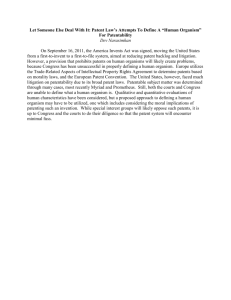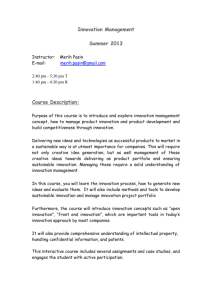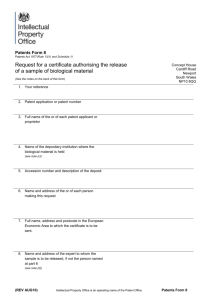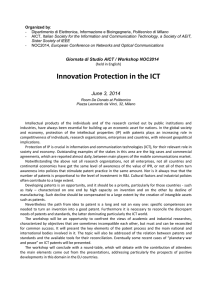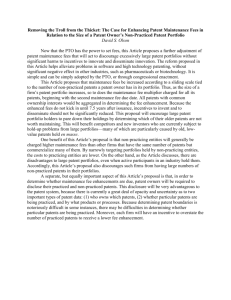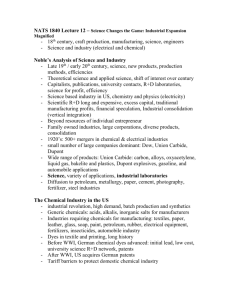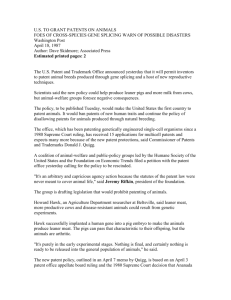Re Casey's Patents
advertisement
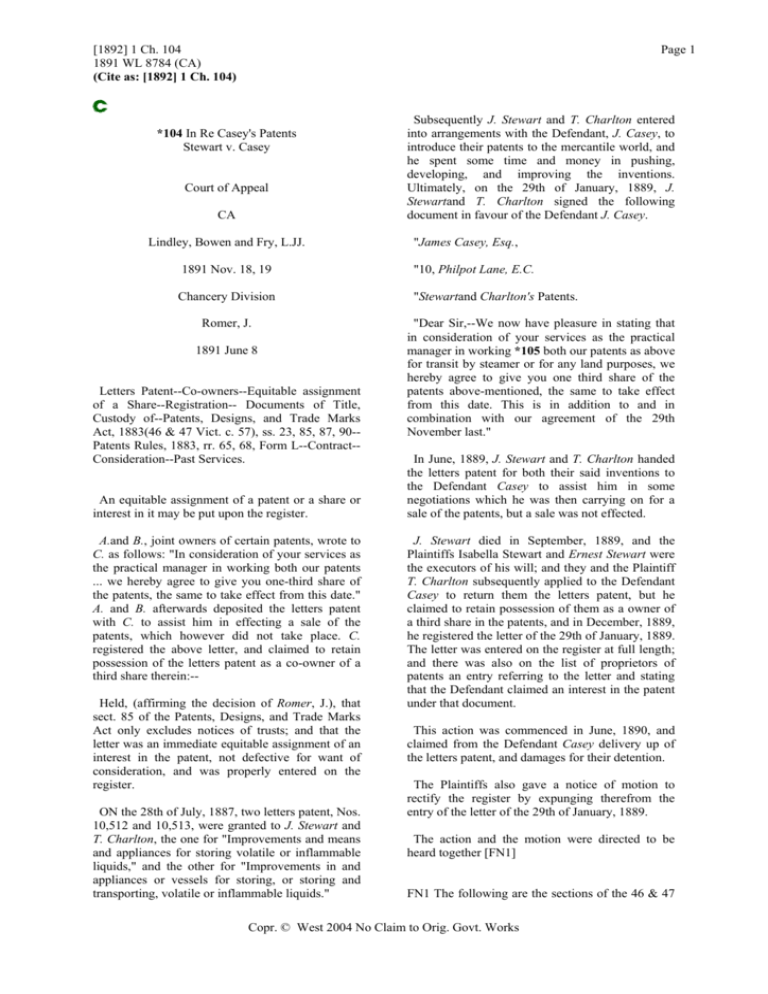
[1892] 1 Ch. 104 1891 WL 8784 (CA) (Cite as: [1892] 1 Ch. 104) Page 1 *104 In Re Casey's Patents Stewart v. Casey Court of Appeal CA Lindley, Bowen and Fry, L.JJ. Subsequently J. Stewart and T. Charlton entered into arrangements with the Defendant, J. Casey, to introduce their patents to the mercantile world, and he spent some time and money in pushing, developing, and improving the inventions. Ultimately, on the 29th of January, 1889, J. Stewartand T. Charlton signed the following document in favour of the Defendant J. Casey. "James Casey, Esq., 1891 Nov. 18, 19 "10, Philpot Lane, E.C. Chancery Division "Stewartand Charlton's Patents. Romer, J. 1891 June 8 Letters Patent--Co-owners--Equitable assignment of a Share--Registration-- Documents of Title, Custody of--Patents, Designs, and Trade Marks Act, 1883(46 & 47 Vict. c. 57), ss. 23, 85, 87, 90-Patents Rules, 1883, rr. 65, 68, Form L--Contract-Consideration--Past Services. An equitable assignment of a patent or a share or interest in it may be put upon the register. A.and B., joint owners of certain patents, wrote to C. as follows: "In consideration of your services as the practical manager in working both our patents ... we hereby agree to give you one-third share of the patents, the same to take effect from this date." A. and B. afterwards deposited the letters patent with C. to assist him in effecting a sale of the patents, which however did not take place. C. registered the above letter, and claimed to retain possession of the letters patent as a co-owner of a third share therein:-Held, (affirming the decision of Romer, J.), that sect. 85 of the Patents, Designs, and Trade Marks Act only excludes notices of trusts; and that the letter was an immediate equitable assignment of an interest in the patent, not defective for want of consideration, and was properly entered on the register. ON the 28th of July, 1887, two letters patent, Nos. 10,512 and 10,513, were granted to J. Stewart and T. Charlton, the one for "Improvements and means and appliances for storing volatile or inflammable liquids," and the other for "Improvements in and appliances or vessels for storing, or storing and transporting, volatile or inflammable liquids." "Dear Sir,--We now have pleasure in stating that in consideration of your services as the practical manager in working *105 both our patents as above for transit by steamer or for any land purposes, we hereby agree to give you one third share of the patents above-mentioned, the same to take effect from this date. This is in addition to and in combination with our agreement of the 29th November last." In June, 1889, J. Stewart and T. Charlton handed the letters patent for both their said inventions to the Defendant Casey to assist him in some negotiations which he was then carrying on for a sale of the patents, but a sale was not effected. J. Stewart died in September, 1889, and the Plaintiffs Isabella Stewart and Ernest Stewart were the executors of his will; and they and the Plaintiff T. Charlton subsequently applied to the Defendant Casey to return them the letters patent, but he claimed to retain possession of them as a owner of a third share in the patents, and in December, 1889, he registered the letter of the 29th of January, 1889. The letter was entered on the register at full length; and there was also on the list of proprietors of patents an entry referring to the letter and stating that the Defendant claimed an interest in the patent under that document. This action was commenced in June, 1890, and claimed from the Defendant Casey delivery up of the letters patent, and damages for their detention. The Plaintiffs also gave a notice of motion to rectify the register by expunging therefrom the entry of the letter of the 29th of January, 1889. The action and the motion were directed to be heard together [FN1] FN1 The following are the sections of the 46 & 47 Copr. © West 2004 No Claim to Orig. Govt. Works [1892] 1 Ch. 104 1891 WL 8784 (CA) (Cite as: [1892] 1 Ch. 104) Page 2 Vict. c. 57, specially referred to in the argument:-Sect. 23: "(1) There shall be kept at the Patent Office a book called the Register of Patents, wherein shall be entered the names and addresses of grantees of patents, notifications of assignments and of transmissions of patents, of licenses under patents, and of amendments, extensions, and revocations of patents, and such other matters affecting the validity or proprietorship of patents as may from time to time be prescribed. "(2) The Register of Patents shall be prima facie evidence of any matters by this Act directed or authorized to be inserted therein. "(3.) Copies of deeds, licenses, and other documents affecting the proprietorship in any letters patent, or in any license thereunder, must be supplied to the Comptroller in the prescribed manner for filing in the Patent Office." Sect. 85: "There shall not be entered in any register kept under this Act, or be receivable by the Comptroller, any notice of any trust expressed, implied, or constructive. " Sect. 87: "... The person for the time being entered in the Register of Patents, Designs, or Trade-marks, as proprietor of a patent, copyright in a design, or trade-mark, as the case may be, shall, subject to any rights appearing from such register to be vested in any other person, have power absolutely to assign, grant licenses as to, or otherwise deal with, the same and to give effectual receipts for any consideration for such assignment, license, or dealing. Provided that any equities in respect of such patent, design, or trade-mark may be enforced in like manner as in respect of any other personal property." Sect. 90: "The Court may, on the application of any person aggrieved by the omission without sufficient cause of the name of any person from any register kept under this Act, or by any entry made without sufficient cause in any such register, make such order for making, expunging, or varying the entry, as the Court thinks fit; or the Court may refuse the application; and in either case may make such order with respect to the costs of the proceedings as the Court thinks fit." *106 They were heard before Mr. Justice Romer on the 8th of June, 1891. E. M. Daniel, for the Plaintiffs:-The letter is an executory agreement, and not capable of registration. It was intended that when the Defendant had rendered certain services he was to have a share in the patents, and the patentees would be trustees of that interest for him, but he has not rendered those services. But if it is an equitable assignment, then it is not a document which the Legislature contemplated should be registered. It is not an assignment of the patent within the terms of sect. 23 of the Patents, &c., Act, 1883, and of rules 65-68 of the Patents Rules, 1883, which are based on the section. No trust is to appear on the register, sect. 85; and entry on the register gives a legal right to deal with the patent, leaving equities to be enforced in the usual manner, sect. 87. The intention of the Legislature is that deeds and other formal documents affecting the legal title in patents should appear on the register, and not every indefinite document like the present. Form L in the schedule to the rules supports this view. But if the Defendant is entitled to a third share of the patents, he has no right to retain the letters patent which were given him only for a particular purpose that has failed. *107 Cutler, Q.C., and Bissill, for the Defendant:The letter is clear and consistent, and conferred an immediate interest on the Defendant. It is not a trust, and therefore it can be registered. A patent is a chose in action and there is no difference between a legal and equitable interest in it, and a deed is not necessary for transmitting any interest in it. The 3rd sub-section of sect. 23 points to documents other than deeds. This is a document "affecting the proprietorship" of the patent, and therefore capable of registration. As to the retention of the letters patent, the Defendant is a co-owner, and has expended considerable sums in relation to them. Daniel, in reply. ROMER, J.:-- The first point I have to consider is, what is the effect of the document of the 29th of January, 1889, bearing in mind the prior correspondence and the surrounding facts which have been put in evidence before me? In my judgment, it was intended to confer by that document on the Defendant a one-third share in the patents as from its date. On the evidence there was clearly consideration enough to support the transaction, and it was not intended that the interest conferred on the Defendant should be in any way conditional. Indeed the document in itself is plain as shewing that it was intended to take effect from its very date. It appears to me, therefore, that in the broad sense of the term, it was an assignment of an interest in the patents, that interest being a onethird interest, and that the Defendant became entitled to that one-third interest as and from the date of the document. That being so, the next question is, whether the Comptroller has rightly permitted an entry on the Copr. © West 2004 No Claim to Orig. Govt. Works [1892] 1 Ch. 104 1891 WL 8784 (CA) (Cite as: [1892] 1 Ch. 104) Page 3 Register of Patents of the Defendant's interest under that document? I think the Comptroller was right. If it was, as I think in the broad sense of the term it was, "an assignment of an interest" in the patents, then it comes within the provisions of rule 65, and is a matter affecting the proprietorship of the patents, which it is prescribed by rule 65 shall be entered in the register--I am bound to say not *108 in so many terms, but by necessary, or, at any rate, sufficient implication. But, in addition to that, even if it was not an assignment properly so called of an interest in a patent, then it appears to me it was a "document affecting the proprietorship" of the patents, and which, therefore, under rule 68, should be entered in the register according to the provisions of sect. 23 of the Act. I agree that rule 68 does not in absolute terms prescribe its entry, but it does, I think, by necessary, or, at any rate, sufficient implication. That being so, I think that the entry by the Comptroller was proper, and that the motion to expunge the entry fails, and must be refused with costs. Then as to the action: that is practically disposed of by what I have already said; but I think both parties were to a certain extent wrong. The Plaintiffs were wrong in seeking to establish that the Defendant had no interest in the patents, and no right in respect of the documents which were in his possession, except as an agent for them, and the Defendant was wrong in retaining possession of the letters patent as against the Plaintiffs. It appears to me that the Defendant obtained possession of the documents of title, the letters patent, for the purpose of carrying out the sale which was referred to in the correspondence, and that when the sale fell through the Defendant, as the owner of onethird of the letters patent, could not properly retain them as against the Plaintiffs. But I need not further deal with the matter, because the Defendant has undertaken, notwithstanding his right to one-third of the letters patent, to hand over to the Plaintiffs, as owners of two-thirds of the letters patent, the two documents in question, and I need upon that undertaking make no other order in the action except that each party pay their own costs. There will be liberty to apply. (H. L. F.) The Plaintiffs appealed from this decision. The appeal came on to be heard on the 18th of November, 1891. E. M. Daniel, and W. Mackenzie, for the Appellants:-An ambiguous and informal document like the letter of the 29th of January, 1889, ought not to be on the register as an assignment within sects. 23, 85, and 87 of the Patents, &c., Act, 1883 *109 . It is not an assignment; it cannot amount to more than an agreement to assign. There was no consideration for the agreement, and no immediate interest passed. It at most confers only an equitable title, which may be enforced by proceedings in Equity like any other equitable demand, but of which by the express provision of the Act no notice can be placed on the register. An assignment should be by deed. [BOWEN, L.J.:--Was it so under 15 & 16 Vict. c. 83, s. 35?] The point has not been decided, though it has been held that a license need not be made by deed: Chanter v. Dewhurst [FN2]. A mere licensee cannot sue alone: Heap v. Hartley [FN3]. The old rule still applies to assignments. As there is no legal assignment, there ought to be no entry on the register. FN2 12 M. & W. 823. FN3 5 Rep. Pat. Cas. 603. [They also referred to rules 65 and 68 of the Patents Rules, 1883.] Cutler, Q.C., and Bissill, for the Defendant, were not called on. LINDLEY, L.J.:-This is an appeal from an Order made by Mr. Justice Romer, and the question raised by the appeal is whether an entry on the Register of Patents ought to be expunged. In order to determine that question, the first thing is to see what the entry is. We have sent for and looked at the book, and have seen what is registered. What is registered is this: There is on the file in the Patent Office a letter dated the 29th of January, 1889, written and signed by Stewart and Charlton, who are the registered proprietors of the two patents, addressed to Mr. Casey, at whose request this document was entered on the register. The letter runs thus: "Dear Sir,-Stewart and Charlton's Patents,--We now have pleasure in stating that in consideration of your services as the practical manager in working our patents as above, for transit by steamer or for any land purposes, we agree to give you one third share of the patents above mentioned, the same to take effect from this date. This is in addition to and in Copr. © West 2004 No Claim to Orig. Govt. Works [1892] 1 Ch. 104 1891 WL 8784 (CA) (Cite as: [1892] 1 Ch. 104) Page 4 combination with our agreement of the *110 29th November last." Casey has taken that document, as I say, to the Comptroller, with a request to have it registered, and that document has been registered. In addition to that there is in the book of proprietors an entry referring to this registered document, and stating in substance that Casey claims an interest in these patents under it. The application to us, therefore, is to expunge those two entries, and the question is whether Messrs. Stewart and Charlton are entitled to have them expunged. For that purpose we must have regard to the sections in the Patent Act of 1883 which relate to this matter, and see what can be properly registered, and what the expunging section says about removing from the register entries improperly made. The important sections are 23, 85, 87, and 90. [His Lordship read sect. 23, and continued:--] Pausing there for a moment, and bearing in mind that before the Act of 1883 the right method of assigning a patent was by deed, and not finding in the present Act anything that alters the law in that respect, I suppose it must be taken that the proper mode of assigning a patent is by deed now; but bearing that in mind, it is quite obvious that something more than assignments by deed may be registered. The words of sect. 23, "affecting the validity or proprietorship of patents," point indisputably, taken in conjunction with the context, to something besides deeds, and something besides probates of wills and matters of that kind. Then sect. 85 must be construed with sect. 23, and the two must be read as one, so as to work together. [His Lordship read sect. 85, and continued:--] Reading those two sections together, there are two methods of interpreting them. One is, to say that sect. 85 excludes and renders it improper to register any document of any sort or kind which upon the perusal of it gives notice of any trust. That is one method of reading it; and the other is to confine sect. 85 to that which it speaks of, "notice of any trust." If you put the first interpretation on sect. 85 you destroy sect. 23, or a great deal of it. You cannot put such a Construction on sect. 85 as to exclude from registration all documents affecting the proprietorship of the patents which, when looked at, will shew that there is a trust. That cannot be the theory of it. If that had been so, sect. 23 would have been *111 very differently worded. In order to interpret the two sections together, you must draw a distinction between agreements and other documents which do affect the proprietorship and simple notices of trusts; and whereas, on the one hand, notice of a trust is not to be put on, documents which affect the proprietorship, whether by creating trusts or otherwise, are not to be excluded. That is how I understand these sections, and that interpretation will make them work, and make them work in practice, as I believe, in fact, they are worked. Then sect. 87 is this: [His Lordship read that section.] That section again throws light, I think, on the true construction of the two previous sections, 23 and 85, which shews that the interpretation I have suggested is the correct one. Then sect. 90 is as follows:--[His Lordship read the section.] There is no question, I suppose, that Mr. Daniel'sclients are persons who would be aggrieved and entitled to apply to have this entry expunged if this entry were not properly on the register itself. Now, passing to the rules, which we must do in order to see how this is practically worked, we begin with rule 64, under the head of "Register of Patents." Rule 64 says, that "the Comptroller shall cause to be entered on the Register of Patents the name, address, and description of the patentee as the grantee thereof," so as to give a sort of root of title. Everything must come on the register. Then rule 65: "Where a person becomes entitled to a patent or to any share or interest therein, by assignment, either throughout the United Kingdom and the Isle of Man, or for any place or places therein, or by transmission or other operation of law"--that is, assignment, or transmission, or other operation of law--"a request for the entry of his name in the register as such complete or partial proprietor of the patent, or of such share or interest therein, as the case may be, shall be addressed to the Comptroller." Now, is "assignment" there to be read as assignment by deed? That, I think, would be putting far too narrow a construction on it, as I think will be apparent when we look at rule 68. Rule 68 says, and it must be taken in connection with rule 65: "Every assignment and every other document containing, giving effect to, or being evidence of, the transmission of a patent or affecting the proprietorship thereof *112 as claimed by such request, except such documents as are matters of record, shall be produced to the Comptroller, together with the request." That indicates something far less formal than a legal assignment by deed. It is impossible, I think, to cut those words down so as to exclude agreements relating to, or, in the language of the rule, "affecting the proprietorship" of the patent. Then rule 69 is only, that "There shall also be left with the request an examined copy of the assignment or other document above required to be produced." In pursuance of these enactments and rules, Mr. Casey did, as I have said, take this letter to the Comptroller and request him to register it. The Copr. © West 2004 No Claim to Orig. Govt. Works [1892] 1 Ch. 104 1891 WL 8784 (CA) (Cite as: [1892] 1 Ch. 104) Page 5 Comptroller has done so, as I have mentioned; and the question is whether he has done wrong. It appears to me that there is nothing wrong, and that this is one of those documents which are intended to be registered under sect. 23, and which do not amount to an infringement of the prohibition against entry of notices of trusts under sect. 85. The effect of this document is unquestionably to give Mr. Casey an immediate equitable interest in these patents. I do not think any one can say that he is interested as legal proprietor, and I do not say he is so entitled. That is quite another matter; but that he has an immediate equitable interest in one-third of the patents is too plain for reasonable doubt. It is not simply an agreement to transfer the patents-that might be different--but it is an agreement "to give you one-third share of the patents above mentioned, the same to take effect from this date." Those are the important words which convert this into an immediate equitable assignment of the patent. Mr. Casey was quite right in having that registered. The only conceivable doubt was whether registering this document was an infringement of sect. 85, referring to notices of trusts, and I think it is not. Therefore, this appeal must be dismissed. BOWEN, L.J.:-- This is the first time that this particular point has come before the Court, and perhaps that may be an excuse for my adding a few words of my own to shew that we have all brought our minds *113 to bear on this question. I will begin by saying what it is exactly that we are deciding, and what the point of law is. What I understand our decision to be is this, that equitable assignments of a patent, or of a share in a patent, may be entered on the register, not indeed as legal assignments, but entered under sect. 23 of the Act, in combination with rule 65, as documents which affect the proprietorship of patents, and as such prescribed by rule 65 for entry. Now, that being the point of what we decide, let us see how the case has reached that point. This is an application to expunge the entry on the register, not of the name of a person, but of a document which has been put on the register. This application, when first launched by Mr. Daniel, whose materials only became perfect in his hands during the progress of the case, was launched by him as a case in which he had a right to expunge the entry of the assignment of a patent. He said that this document is not the assignment of a patent under sect. 87, and ought, therefore, not to be put upon the register as such. If, indeed, this had been the case of the entry under sect. 87 of the assignment of a patent and the treatment under sect. 87 of Mr. Cutler's client as a person who had become entitled by assignment under that section, at the present moment it strikes me that Mr. Daniel would have been right. It is not necessary to decide the question; but, as I think we all entertain the same opinion, I do not see why I should not mention it, always reserving our right to decide, if the question really arises, differently. But it certainly does strike one that a patent which is created by deed can only be assigned by deed, and for that view one may refer shortly to the case in Coke [FN4], and the case, although it was a copyright case, of Power v. Walker [FN5]. In illustration of that view, one may mention that licenses are by deed; and it does strike me as probable that now, as before the Act, legal proprietorship is that which is dealt with under sect. 87, and that the person who is the proprietor of the patent means the proprietor of the patent in law. Therefore, it would be wrong, it seems to me, to treat a writing not under deed as if it was an assign*114 ment of a patent which would give a right to the person who claimed under it to consider himself as the legal proprietor. It may seem strange that in these days still there should be differences between transactions which are effected by seal and transactions which are not--for instance, between equitable rights and legal rights. But the theory of the law of registration, both about patents and many other things which could be mentioned, being based on the wish to simplify transactions, I think has gone constantly to this, that the legal estate is that which for the purpose of business it is desirable to keep to as regards the register, and I am not at all sure that that is not the true view of sect. 87 of the Act. But during the argument it transpired that nothing had been done of the sort which Mr. Daniel supposed. We sent for the register and examined it, and there is no change of the legal proprietorship effected on the register. Nothing at all has happened except an entry on the register by means of the filing of this document, which I will examine in a moment. Therefore, even if what has been effected would not be justified by sect. 87, it is not one of those transactions which are to be judged by sect. 87, but by some other section. What other section is there that justifies entries upon the register, even though they do not amount to the legal transfer of title? Sect. 23, which creates the register, and says that the names and addresses of grantees of patents, notifications of assignments, transmissions of patents and of licenses, are to be entered, "and such other matters affecting the validity or proprietorship of patents as may from time to time be prescribed." "Prescribed" in the section means, of course, prescribed by rule. We have, therefore, not merely to consider whether this is a legal assignment of the patents, but Copr. © West 2004 No Claim to Orig. Govt. Works [1892] 1 Ch. 104 1891 WL 8784 (CA) (Cite as: [1892] 1 Ch. 104) Page 6 whether it is a matter that affects the proprietorship of the patents; and if we consider that it is a matter which affects the proprietorship of the patents, then the only real question remains, whether it is such a matter as is prescribed by rule, or comes within the rule. FN4 Lincoln College's Case, 3 Rep. 63a. FN5 3 M. & S. 7. Now, first, is it a matter affecting the proprietorship of the patents? For that purpose the document itself must be examined. The document is one by which the signatories agree with Mr. Casey to give him "one-third share of the patents *115 above mentioned, the same to take effect from this date." It cannot be denied that that is an equitable assignment if it is anything. It is not an agreement to take effect at some future date. It is an agreement to give him the share as from the date of the document, and it immediately passes in Equity the right to the third share. But then it was said by Mr. Daniel, "But there is no consideration, and this document is not under seal." We will see if there is consideration. The consideration is stated, such as it is. It is, "in consideration of your services as the practical manager in working our patents as above for transit by steamer." Then says Mr. Daniel, "Yes, but that is a future consideration, and a future consideration, if nothing were done under it or nothing was proved to be done, would fail." The answer to that is that the consideration is not the rendering of the services, as is plain from the fact that the document is to take effect in Equity from the date. The consideration must be something other than rendering services in the future. It is the promise to render them which those words imply, that constitutes the consideration; and the promise to render future services, if an effectual promise, is certainly good consideration. Then, driven from that, Mr. Daniel said, "Oh! but it is past services that it means, and past services are not a consideration for anything." Well, that raises the old question--or might raise it, if there was not an answer to it--of Lampleigh v. Braithwait [FN6], a subject of great interest to every scientific lawyer, as to whether a past service will support a promise. I do not propose to discuss that question, or, perhaps, I should not have finished this week. I should have to examine the whole state of the law as to, and the history of the subject of, consideration, which, I need hardly say, I do not propose to do. But the answer to Mr. Daniel's point is clear. Even if it were true, as some scientific students of law believe, that a past service cannot support a future promise, you must look at the document and see if the promise cannot receive a proper effect in some other way. Now, the fact of a past service raises an implication that at the time it was rendered it was to be paid for, and, if it was a service which was to be paid *116 for, when you get in the subsequent document a promise to pay, that promise may be treated either as an admission which evidences or as a positive bargain which fixes the amount of that reasonable remuneration on the faith of which the service was originally rendered. So that here for past services there is ample justification for the promise to give the third share. Therefore, this is an equitable assignment which cannot be impeached. FN6 1 Sm. L. C. 8th Ed. p. 151. If it is an equitable assignment, it is a document which affects the proprietorship of the patent. It does not alter the proprietorship, but it affects it because it gives a man a right in equity to have it altered at law. The only objection to that could be, if it was a valid one, the objection which might arise under sect. 85, which says that notices of trusts are not to be entered upon the register. If it could be made out that an equitable assignment was not to be entered on the register simply because it created a trust, and therefore carried with it the notice of the trust which was created--if sect. 85 was to be expanded or stretched to that enormous length, then Mr. Daniel's client might succeed. But what does sect. 85 mean? Trusts had been registered up to that time by the Patent Office; but this section intended that notices of trusts, as distinct from documents which created trusts in Equity, were not to be sent to the Comptroller and entered upon the register. Nobody has a right under this Act to affect the register with the burden of a notice of a trust. That is what I think this section means. Nobody who may have gone to the register and examined it shall be in peril of being affected with notice of a trust or any other interest except that which appears on the register. Again, by sect. 87, to go back for a moment in order to make this point clear, the assignment of the legal proprietorship of the patent is to take effect "subject to any rights appearing from such register to be vested in any other person." Sect. 85then becomes important. The assignee takes subject to the rights which appear on the register to be vested in somebody else; but nobody is to clog the register by simply giving a notice of a trust, whether the trust is expressed, implied, or constructive. That does not prevent a document being entered which affects the proprietorship, nor can such document be expunged on the ground that, although it affects Copr. © West 2004 No Claim to Orig. Govt. Works [1892] 1 Ch. 104 1891 WL 8784 (CA) (Cite as: [1892] 1 Ch. 104) Page 7 the proprietorship, *117 anybody who reads the document will see there is a trust created by it. All that remains, therefore, to be considered is whether this entry is prescribed by the rules. There is a little difficulty about the rules, but the rules must have such working effect given to them as makes them intelligible and sensible. Rule 65 is the rule which we must consider in order to see whether this is an entry affecting the proprietorship which comes within it. In regard to that rule, it must be recollected that the Act of Parliament under sect. 23 intended that matters which affected the proprietorship, but which did not amount to a transfer of proprietorship, should be entered if the rules so prescribed; and when you come to the rule you see that a person has a right to request the entry, not merely of the assignment of the patent, but of the assignment of any interest in the patent. There, I think, the word "assignment" must receive a liberal interpretation, and not the confined one which has been given it under rule 65 when dealing with assignments of a patent. I think the word is large enough to cover equitable assignments of interests or equitable assignments of a patent, and that there is a right to have entered upon the register as a document affecting the proprietorship of a patent any equitable assignment either of a patent or of any share or interest in a patent. That seems to me the true view of this Act. Rule 68, which the Lord Justice Lindley called attention to, bears that out most completely, because it is not only that "every assignment," but every other document of title is to be produced to the Comptroller, and such other proof of title as he may require for his satisfaction. Therefore, I come back to say, that what we have decided is, that under this Act the equitable assignment of a patent, or of a share or interest in a patent, may be entered on the register under sect. 23 by virtue of the operation of rule 65, which is wide enough to include those documents though they do not fall under sect. 87 of the Act. FRY, L.J.:-- The first question in this case is, what is the document of the 29th of January, 1889? Is it an agreement and nothing more, *118 or does it amount to an equitable assignment? The distinction I take to be this: That an agreement which does not exhibit the intention of the parties that the property shall pass at once does not take effect as an equitable assignment at once, but only when, from the terms of the agreement, it can be gathered that the intention of the parties is that the equitable property shall pass. On the other hand, where the intention is that the property shall pass either at once or upon the satisfaction of some condition, then the equitable property does pass at once or upon satisfaction of that condition, as the case may be. Now here the document upon its very face expresses the intention that the property shall pass at once--that it shall come out of the grantors and be vested in the grantee on the very day of the writing of the instrument. The instrument, therefore, is, in my opinion, not merely an agreement, but it is an agreement which effects an equitable assignment of an equitable interest in the patent. That being so, we have to apply ourselves to the statute, and I shall be very short in expressing my view of it. I think that this case is governed by the 23rd section of the statute of 1883, taken in conjunction with the 65th rule. I incline to think that the words "notifications of assignments" in the earlier part of sect. 23 apply only to legal assignments of patents; but then there are the words, "and such other matters affecting the validity or proprietorship of patents as may from time to time be prescribed." We know that the prescription is found in rule 65, and that says, that "Where a person becomes entitled to a patent or to any share or interest therein, by assignment." It appears to me that that clause does not extend to agreements which do not operate as an assignment of the equitable interest, but that it does extend to agreements which do make an equitable assignment of an interest. It is impossible, I think, according to the reasonable construction of these rules, to hold that interest must be a legal interest. "Any interest" must include equitable interests. They are the commonest kind of interest to create in property. They are as familiar to every lawyer as legal interests. The language, therefore, must include, in my view, equitable interests. Equitable interests pass by *119 equitable assignments, and that is exactly what this instrument is. That it was the intention of the Legislature and the expectation of the Legislature that interests other than legal interests constituting proprietorship should appear is plain from the 87th section. That puts the power of conferring a title--a power of absolute assignment--in the hands of the person who for the time being is entered on the Register of Patents as proprietor. But, subject to what? "Subject to any rights appearing from such register to be vested in any other person." The rights of proprietorship are purely legal rights; but any other rights--any right that may appear on the register-must, therefore, be, if not a legal right to proprietorship, either a legal right of some lesser description or an equitable right; and, therefore, it seems to me to be plain that the Legislature Copr. © West 2004 No Claim to Orig. Govt. Works [1892] 1 Ch. 104 1891 WL 8784 (CA) (Cite as: [1892] 1 Ch. 104) Page 8 contemplated the prescription by the rules of a power to enter on the register rights which were not rights of proprietorship--including equitable rights. The only other question is this. Is all that obvious intention of the Act excluded by the 85th section? I take exactly the same view of that section that has been expressed by my learned Brothers. I think it prevents A. from being put on the register with notice that he is a trustee for B.; but B.'s estate may, if B. goes through the proper formalities, makes his request, and produces his documents, be put on the register, not because A. is his trustee, but because B. has an equitable interest. So, in the present case, it is impossible to say that the fact that this equitable assignment may create a trust prevents it from creating an interest within the meaning of the word used in the rule, or a right within the meaning of the 87th section which would preclude its being put on the register. I think, therefore, that the 85th section must be read in the mode already suggested, and that the view taken in this case by the learned Judge in the Court below was perfectly accurate. The appeal must, therefore, be dismissed with costs. Representation Solicitor for Plaintiffs: H. M. Smith. Solicitor for Defendant: H. Nanson. (M. W.) (c) Incorporated Council of Law Reporting For England & Wales END OF DOCUMENT Copr. © West 2004 No Claim to Orig. Govt. Works
